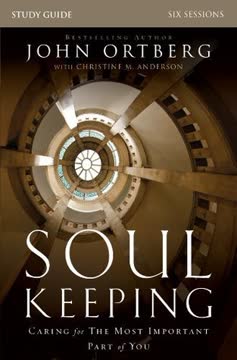Key Takeaways
1. The soul is the essence of who we are, integrating will, mind, and body
You are an unceasing spiritual being with an eternal destiny in God's great universe.
The soul as integrator. The soul is the deepest part of our being, connecting and coordinating our will (intentions), mind (thoughts and feelings), and body (actions). It seeks harmony between these elements and with God's intent for creation. A healthy soul experiences integration, while sin causes disintegration.
Eternal significance. Our souls are not just temporary; they have eternal consequences. This understanding should shape how we live and what we prioritize. The condition of our souls at the end of our lives is what truly matters, not our accomplishments or possessions.
Soul awareness. Recognizing the importance of our souls can transform how we approach life. It shifts our focus from external circumstances to internal well-being, from temporary satisfaction to eternal significance. This awareness can lead to more intentional living and a deeper sense of purpose.
2. Our souls crave connection with God and need constant care
The soul is like a stream of water, which gives strength, direction, and harmony to every other area of our life.
Soul's primary need. The soul has an innate longing for God, designed to find its fulfillment in a relationship with Him. This connection is not just a religious concept but a fundamental aspect of human nature. When this need is unmet, we often try to fill it with other things, leading to dissatisfaction.
Ongoing maintenance. Like a stream that needs constant tending, our souls require regular care. This involves:
- Spiritual practices (prayer, meditation, worship)
- Self-reflection and introspection
- Cultivating virtues and positive habits
- Addressing sin and negative patterns
Personal responsibility. While community and spiritual leaders can offer guidance, ultimately, each individual is responsible for the care of their own soul. This requires intentionality and commitment to prioritize soul care amidst life's many demands.
3. Sin disintegrates the soul, while obedience to God brings freedom
To become truly free, you must surrender.
The nature of sin. Sin is not just about breaking rules; it's a force that fragments our inner being. It creates discord between our will, mind, and body, leading to internal conflict and dissatisfaction. This disintegration affects not only our relationship with God but also our relationships with others and our sense of self.
Paradox of surrender. True freedom comes not from doing whatever we want, but from aligning ourselves with God's design for our lives. This involves:
- Recognizing our limitations and need for God
- Submitting our will to God's wisdom
- Embracing spiritual disciplines and obedience
Gradual transformation. The journey from sin to freedom is often a gradual process. It involves developing new habits, renewing our minds, and consistently choosing to align with God's will. This transformation leads to a sense of integration and peace within our souls.
4. The soul needs rest, blessing, and gratitude to thrive
Arrange your days so that you are experiencing total contentment, joy, and confidence in your everyday life with God.
Rest for the soul. In our busy world, the soul craves rest. This is not just physical rest, but a deeper spiritual rest that comes from:
- Practicing Sabbath and regular periods of solitude
- Learning to be still and present with God
- Letting go of the need to constantly achieve or produce
The power of blessing. Actively blessing others (and receiving blessings) nourishes the soul. This involves:
- Intentionally speaking words of affirmation and encouragement
- Praying for others' well-being
- Performing acts of kindness and generosity
Cultivating gratitude. A grateful heart is essential for a healthy soul. Practices to develop gratitude include:
- Daily reflection on God's blessings
- Keeping a gratitude journal
- Expressing thankfulness to others and to God
5. Suffering can lead to spiritual growth and deeper connection with God
If you ask people who believe in God when they grew most spiritually, the number one answer will be suffering.
Transformative potential. While suffering is painful, it often becomes a catalyst for profound spiritual growth. It can:
- Strip away superficial faith and lead to deeper reliance on God
- Reveal our true priorities and values
- Develop empathy and compassion for others
The "dark night of the soul." Times of spiritual dryness or God's seeming absence can be particularly challenging. However, these experiences can:
- Teach patience and trust in God's timing
- Deepen our understanding of faith beyond emotional experiences
- Prepare us for greater spiritual maturity
Finding meaning in suffering. While we may not understand the reasons for our suffering, we can choose to:
- Seek God's presence and comfort in the midst of pain
- Look for opportunities for growth and transformation
- Use our experiences to help and encourage others
6. Arrange your days to experience contentment and joy in God
You must ruthlessly eliminate hurry from your life.
Intentional living. Creating a life that fosters soul health requires deliberate choices about how we spend our time and energy. This involves:
- Prioritizing activities that nurture our relationship with God
- Setting boundaries to protect time for rest and reflection
- Cultivating habits that promote inner peace and contentment
Eliminating hurry. A hurried life is often an enemy of soul health. Steps to combat this include:
- Practicing mindfulness and being fully present in each moment
- Simplifying our schedules and commitments
- Learning to say "no" to non-essential activities
Pursuing joy in God. True contentment comes from finding our satisfaction in God rather than circumstances. This can be fostered by:
- Regular meditation on God's character and promises
- Cultivating a sense of wonder and gratitude for God's creation
- Seeking to align our desires with God's will for our lives
7. The soul finds ultimate satisfaction only in God, not worldly pursuits
My soul, find rest in God.
The futility of worldly satisfaction. Our culture often promotes the idea that happiness comes from achievements, possessions, or experiences. However, these pursuits ultimately leave the soul unsatisfied because:
- Material things are temporary and can be lost
- Achievements and recognition don't address our deepest needs
- Pleasure-seeking often leads to addiction or emptiness
God as the soul's true home. The soul was designed to find its fulfillment in a relationship with God. This satisfaction comes through:
- Experiencing God's unconditional love and acceptance
- Aligning our lives with God's purposes
- Participating in God's ongoing work in the world
Practical steps toward soul satisfaction. To cultivate this deeper fulfillment:
- Regularly engage in worship and prayer
- Study and meditate on Scripture
- Seek ways to serve others and participate in community
- Practice contentment and gratitude in all circumstances
Last updated:
FAQ
1. What is "Soul Keeping Bible Study Guide: Caring for the Most Important Part of You" by John Ortberg about?
- Focus on the Soul: The book explores the concept of the soul from a Christian perspective, emphasizing its centrality to human life and spiritual well-being.
- Practical Soul Care: Ortberg provides guidance on how to care for, nurture, and restore the soul, drawing on biblical wisdom, personal stories, and insights from his mentor Dallas Willard.
- Integration of Life: The book discusses how the soul integrates the will, mind, and body, and how its health affects every aspect of a person’s life.
- Journey of Transformation: Through stories, parables, and practical advice, Ortberg invites readers on a journey to understand, protect, and grow their souls in relationship with God.
2. Why should I read "Soul Keeping Bible Study Guide" by John Ortberg?
- Addresses Deep Spiritual Needs: The book tackles the often-neglected topic of soul care, which is foundational for lasting spiritual growth and inner peace.
- Accessible and Relatable: Ortberg uses engaging stories, real-life examples, and clear language to make complex spiritual concepts understandable and applicable.
- Guidance from a Trusted Voice: Drawing on the wisdom of Dallas Willard and his own pastoral experience, Ortberg offers trustworthy, biblically grounded advice.
- Practical Tools for Change: Readers receive actionable steps and reflective questions to help them cultivate a healthy soul in the midst of modern life's busyness and distractions.
3. What are the key takeaways from "Soul Keeping Bible Study Guide" by John Ortberg?
- The Soul’s Central Role: The soul is the life-center that integrates all parts of a person and is the most important aspect of who we are.
- Neglect Leads to Disintegration: Ignoring the soul results in inner chaos, disconnection from God, and a lack of true fulfillment, regardless of external success.
- Soul Needs and Practices: The soul requires rest, freedom, blessing, satisfaction, gratitude, and above all, a deep connection with God.
- Personal Responsibility: Each person is the keeper of their own soul and must intentionally arrange their life to nurture it.
4. How does John Ortberg define the soul in "Soul Keeping Bible Study Guide"?
- Life-Center and Integrator: The soul is described as the aspect of our being that integrates the will (choices), mind (thoughts and feelings), and body into a single, whole life.
- Made by and for God: Ortberg, echoing Dallas Willard, teaches that the soul is made by God, for God, and to need God, and is not meant to be self-sufficient.
- Source of Harmony or Disintegration: A healthy soul brings harmony and direction to life, while an unhealthy soul leads to fragmentation and dysfunction.
- Synonymous with the Person: In both biblical and everyday language, “soul” often simply means the whole person, not just an immaterial part.
5. What are the main needs of the soul according to "Soul Keeping Bible Study Guide" by John Ortberg?
- The Soul Needs a Keeper: Each person is responsible for the condition of their own soul and must actively care for it.
- The Soul Needs a Center: The soul requires a stable center, which is found in God, to avoid being tossed by life’s circumstances.
- The Soul Needs Rest and Freedom: True rest and freedom come from living in alignment with God’s design and grace, not from external circumstances or self-indulgence.
- The Soul Needs Blessing, Satisfaction, and Gratitude: The soul thrives on receiving and giving blessing, finding satisfaction in God rather than possessions or achievements, and practicing gratitude.
6. What practical advice does John Ortberg give for caring for your soul in "Soul Keeping Bible Study Guide"?
- Arrange Your Days for God: Ortberg advises arranging your daily life so you experience contentment, joy, and confidence in your everyday relationship with God.
- Ruthlessly Eliminate Hurry: One of the book’s most memorable pieces of advice is to “ruthlessly eliminate hurry,” as hurry is the great enemy of spiritual life.
- Practice Solitude and Rest: Regular times of solitude, rest, and Sabbath are essential for soul health, allowing space for God to restore and refresh you.
- Speak to Your Soul: Engage in honest self-reflection and prayer, addressing your soul directly as modeled in the Psalms, to bring your inner life before God.
7. How does "Soul Keeping Bible Study Guide" by John Ortberg address the problem of a "lost soul"?
- Condition, Not Just Destination: Ortberg reframes “lost soul” as a present condition of disintegration and disconnection from God, not merely a future destination.
- Sin as Disintegration: Sin is described as the force that fractures the soul, causing the will, mind, and body to be at odds with each other and with God.
- Confession and Honesty: Healing begins with honest confession, facing the truth about oneself, and seeking God’s forgiveness and restoration.
- The Soul’s Search for a Father: The book emphasizes the soul’s deep longing for connection, belonging, and the loving presence of God as Father.
8. What are the dangers of neglecting the soul, according to "Soul Keeping Bible Study Guide" by John Ortberg?
- Disintegration and Dysfunction: Neglect leads to a fragmented life where the will, mind, and body are out of sync, resulting in anxiety, addiction, and relational breakdown.
- Superficial Living: The world encourages focus on the self and external achievements, which can crowd out attention to the soul’s deeper needs.
- Vulnerability to Idolatry: When the soul’s needs are not met in God, people turn to idols—money, success, pleasure—which ultimately enslave rather than satisfy.
- Loss of Meaning and Joy: A neglected soul loses its sense of purpose, gratitude, and the ability to experience true joy, even in the midst of outward success.
9. What role does God play in the health of the soul in "Soul Keeping Bible Study Guide" by John Ortberg?
- God as the Soul’s Home: The soul was created to be with God, and only in God’s presence does it find rest, satisfaction, and wholeness.
- With-God Life: Ortberg emphasizes the importance of living every moment in conscious awareness of God, not just during religious activities.
- Grace and Acceptance: God’s acceptance and sustaining grace are foundational for soul health, providing security and significance apart from performance.
- Restoration and Healing: God pursues, restores, and heals the soul, especially in times of suffering, darkness, or spiritual dryness.
10. What are the key concepts and metaphors used in "Soul Keeping Bible Study Guide" by John Ortberg to explain the soul?
- The Stream and the Keeper: The soul is likened to a stream that nourishes all of life, and each person is the keeper responsible for its health and purity.
- Concentric Circles: Ortberg uses Dallas Willard’s model of concentric circles—will, mind, body, soul—to illustrate how the soul integrates all parts of the self.
- The Cycle of Grace vs. Cycle of Works: The book contrasts living from God’s grace (acceptance, sustenance, significance, achievement) with striving for worth through performance.
- The Dark Night of the Soul: The experience of spiritual dryness or suffering is described as a “dark night,” a time when God seems absent but is actually deepening the soul.
11. What are some of the most impactful quotes from "Soul Keeping Bible Study Guide" by John Ortberg, and what do they mean?
- “You must ruthlessly eliminate hurry from your life.” – This highlights the necessity of slowing down to nurture the soul and be present with God.
- “The most important thing in your life is not what you do; it’s who you become.” – Emphasizes that character and soul formation are more lasting than achievements.
- “The stream is your soul. And you are the keeper.” – Reminds readers of their responsibility to care for their inner life, which affects everything else.
- “You are an unceasing spiritual being with an eternal destiny in God’s great universe.” – Affirms the eternal value and significance of every person’s soul.
12. How does "Soul Keeping Bible Study Guide" by John Ortberg suggest restoring a damaged or weary soul?
- Embrace the Dark Night: Recognize that seasons of dryness or suffering can be God’s way of deepening and transforming the soul, not signs of failure.
- Wait and Trust: Restoration often requires patient waiting, surrender, and trust in God’s timing rather than frantic self-effort.
- Return to God’s Presence: Reconnect with God through honest prayer, solitude, and practices that open the soul to His love and grace.
- Practice Gratitude and Blessing: Cultivate gratitude and intentionally bless others, which revives the soul and aligns it with God’s purposes.
Similar Books
Download PDF
Download EPUB
.epub digital book format is ideal for reading ebooks on phones, tablets, and e-readers.













